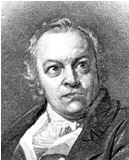Songs of Innocence and Experience by William Blake
Page 12 of 18 - 1 2 3 4 5 6 7 8 9 10 11 12 13 14 15 16 17 18 Purchase full notes for £5.95 (aprox $9.28)
Instead of the eye-contact between cherub and poet in the first illustration, here the imagination is controlled and forcefully directed, with the cherub placed upon the Poet-Shepherd’s head, with both arms held. The imagination no longer floats upon a cloud, but is subject here to the human brain, which directs it through the power of reason. The choice of reason over imagination is set to become a major theme of Blake’s poetry, and is key to the distinction between innocence and experience.
Songs of Experience Title Page
Although some ‘gothic’ innocent vegetation persists, springing from the word ‘SONGS,’ the dominant forms now are classical and rectangular. Strikingly horizontal is the tomb – of a father and mother perhaps, thereby ending the parental protections so important in the world of innocence – and two young adults are bent over these figures in obvious distress. Death is the darkest and most insistent element of experience, particularly the death of loved ones. The innocent vision can only face this taboo area by imagining an afterlife where ‘all shall be well.’ Immediately, therefore, Blake is challenging the assumptions of the innocent viewpoint.
Introduction
The changed relationship between the Shepherd-Piper and the cherub of imagination may make the reader wonder from the very start about the extent to which Blake intends us to agree with the ‘Bard’ who now speaks so forcefully. The illustration sets the text against a black and starry night, which presumably works as a contrary to the daylight settings of innocence . At the foot of the page a naked female reclines on a couch in a rather luxurious and sensual manner.
The basic meaning of this text is a familiar one: mankind (envisaged as ‘Earth’) has sinned (‘lapsed’) and must turn again to the ‘Holy Word.’ This is conventional material, and a close reading of the poem indicates that Blake probably intended a very different meaning.
Firstly, the ‘Bard’ is overly insistent, demanding that his message be heard, since he knows everything – ‘Who Present, Past, & Future sees.’ He talks of God, though, not as the Christ-child or Lamb, but as the ‘Holy Word’ – the fixed, immutable Word of God in the Holy Scriptures that can be rationally interpreted.
Songs of Experience Title Page
Although some ‘gothic’ innocent vegetation persists, springing from the word ‘SONGS,’ the dominant forms now are classical and rectangular. Strikingly horizontal is the tomb – of a father and mother perhaps, thereby ending the parental protections so important in the world of innocence – and two young adults are bent over these figures in obvious distress. Death is the darkest and most insistent element of experience, particularly the death of loved ones. The innocent vision can only face this taboo area by imagining an afterlife where ‘all shall be well.’ Immediately, therefore, Blake is challenging the assumptions of the innocent viewpoint.
Introduction
The changed relationship between the Shepherd-Piper and the cherub of imagination may make the reader wonder from the very start about the extent to which Blake intends us to agree with the ‘Bard’ who now speaks so forcefully. The illustration sets the text against a black and starry night, which presumably works as a contrary to the daylight settings of innocence . At the foot of the page a naked female reclines on a couch in a rather luxurious and sensual manner.
The basic meaning of this text is a familiar one: mankind (envisaged as ‘Earth’) has sinned (‘lapsed’) and must turn again to the ‘Holy Word.’ This is conventional material, and a close reading of the poem indicates that Blake probably intended a very different meaning.
Firstly, the ‘Bard’ is overly insistent, demanding that his message be heard, since he knows everything – ‘Who Present, Past, & Future sees.’ He talks of God, though, not as the Christ-child or Lamb, but as the ‘Holy Word’ – the fixed, immutable Word of God in the Holy Scriptures that can be rationally interpreted.

